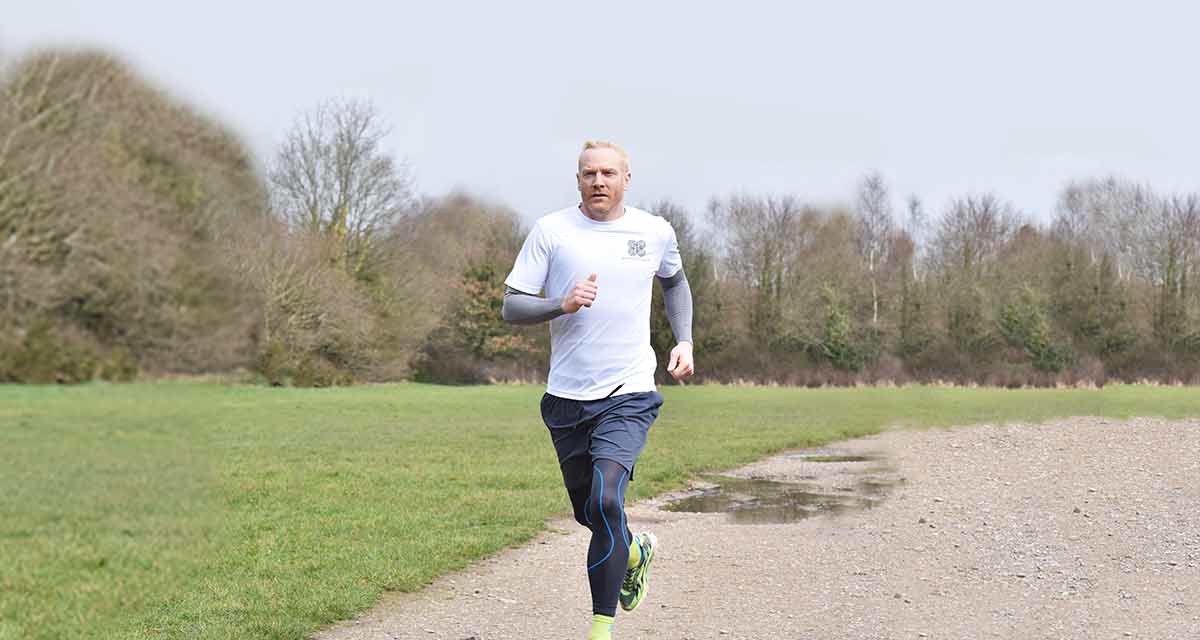Dr. Aria Campbell-Danesh, an expert in the psychology of behaviour change, gives his top seven tips on how to prepare for a 10k race both mentally and physically.
The 10k is the UK's most popular running event, but if you're new to this race, the distance can be daunting. Running a long-distance race can be as much a mental game as a test of physical fitness. Whether this is your first event or you're keen to achieve a new PB, here are seven psychology tips to help.
1. Fill your doubts with helium
Everybody has self-doubts. This is completely natural. However, holding onto these thoughts can impact your performance. Become aware of any self-imposed limitations you might be clinging on to, whether that's being "too old" or "too unfit" to complete your first 10k. Notice when your mind says "I can't" or "I could never." You might be surprised to learn that people over the age of 100 and heavier than 181kg have completed 10ks. It might not be easy, but it is possible.
Top Tip: In your mind, imagine writing your own doubt onto a balloon filled with helium, letting it go, and watching it float into the sky. Create a new empowering thought, which can be motivational (e.g. saying to yourself "I can do this") or instructional (e.g. reminding yourself while running to "relax your shoulders and breathe deeply.") Professional runners and athletes use this psychological technique to raise their performance.
2. Focus on quality
When it comes to nutrition, the latest research challenges the notion that a calorie is a calorie. The quality of the calories going in appears to impact the quantity of calories going out.
A metabolic study from Harvard showed that on a low glycaemic-index (GI) diet (containing foods that are broken down slowly and cause a gradual rise in blood sugar), people's bodies actually burned about 125-159 more calories per day than on a high-GI diet, even though they consumed the same number of calories and did the same amount of physical activity.1
This equates to a higher metabolism and less fat accumulation, which makes running your 10k easier.
Top Tip: Focus on eating a balanced diet with high-quality ingredients. Try the 'half-plate rule' whenever you can: fill half your plate with vegetables (and fruits), a quarter with healthy protein (e.g. fish, poultry, beans and nuts; limit red meat and cheese, and avoid processed meats), and a quarter with high-quality carbohydrates (e.g. brown rice, quinoa, whole-grain pasta, sweet potato.) Use healthy oils for cooking (e.g. rapeseed oil) and dressings (e.g. olive oil).
3. Build up gradually
One of the quickest ways to burn out psychologically and potentially injure yourself is to make sudden, radical changes to your exercise pattern. If you aren't a regular runner, start wherever you are and build up slowly. Consistency is key. Small, regular actions compound over time to lead to big results.

Top Tip: Find a training plan that works for you. There are numerous free ones online, which vary depending on how long you have until your race and how many times per week you wish to train. Choose one that fits best with your level of fitness, lifestyle and current activity. Here's an example of a simple 8-week 'two-run per week' plan for beginners:
| Week | Run 1 (km) | Run 2 (km) |
| 1 | 2.5 | 4.5 |
| 2 | 3 | 5 |
| 3 | 3.5 | 6 |
| 4 | 4 | 7 |
| 5 | 4 | 8 |
| 6 | 3 | 9 |
| 7 | 3 | 5 |
| 8 | 3 | RACE! |
4. Don't try your best
If you want to run your 10k as fast as your body can, then follow the old adage and just try your best, right? Wrong. Scientific analysis reveals that compared with trying your best, setting specific targets increases muscular strength and endurance.2
Top Tip: When you're about to go for a run, create personal goals, whether related to your overall distance, pace, or length of time running. Mentally break down your run into segments in your head. Using a running app or watch makes it easier to track your progress and continually raise your goals, and level of fitness, a little bit higher each week.
5. Find your body's balance
Running is beneficial for your mental wellbeing and physical health. However, it's important that you give your body enough rest. Training uses up your energy stores and places stress on your muscles, bones, ligaments and tendons. Prioritising your recovery will lead to a progressively stronger and fitter body.
Top Tip: If you're new to running, try to have an earlier night on either side of a training run. The amount of recovery time needed between runs will be unique to you, so it's important to listen to your body. If you have a routine where most of your runs go well and you're not becoming slower or experiencing injuries, then you've likely found your balance.
6. Overcome the wall
You've probably heard about, or experienced, 'hitting the wall' when running. That sudden fatigue and feeling that all the energy has drained from your body as your legs begin to slow and your determination wanes. Our mind plays a significant role in this phenomenon.
Research has revealed that runners who expect to hit the wall are more likely to do so. Analysis has found that daydreaming while running increases your chances of fatiguing, and focusing too much on the discomfort that you're experiencing makes it harder to recover during the race.3
Top Tip: When you're running, make brief, regular 'internal checks' on your breathing, thirst, and body. However, direct your attention outwards most of the time, particularly when you begin to tire. Take in the scenery, from the landscape to the passers-by. This will give you the greatest chance of optimising your performance and achieving a faster time.

From training sessions to food, hydration and recovery, check out Olympic athlete Iwan Thomas' top 10k training and nutrition tips.
Find out more
7. Transform your fears
Our brains have evolved to scan the environment for threats. This 'negativity bias' has ensured our species' survival, but can play havoc with our motivation. We often find ourselves focusing on the negative, from 'awful' training runs to old injuries. Our minds come up with fears, like dropping out of the race, finishing last, or getting a 'bad time.'
It's useful to remind yourself that having fears is a reflection of a healthy, normal mind. If you didn't have this particular fear, your mind would simply create another one. Rather than dwelling on the negative, shift your attention to the positive, for instance tapping into that sense of satisfaction you'll gain from finishing the 10k, thinking about the difference that raising money for a charity race will make, visualising yourself running in a smooth and relaxed way, or imagining the post-race meal you'll enjoy afterwards.
Top Tip: At the end of each day note down three things that went well, whether related to a training run, eating well, or anything else. This science-based strategy will retrain your brain to see the positive, recognise the progress you're making, and leave you feeling happier and more motivated in the long run.
Running is hard, but fun. Whether you're a novice or a seasoned runner, there will be moments during a race that are physically and mentally taxing. However, there's a reason so many people take up the challenge of running a 10k: the payoffs, including the sense of achievement, far outweigh the pain. Remember, you don't have to run a 10k, it's something you've chosen to do! Prepare your mind and your body, and the race will take care of itself. Good luck and enjoy the journey!









